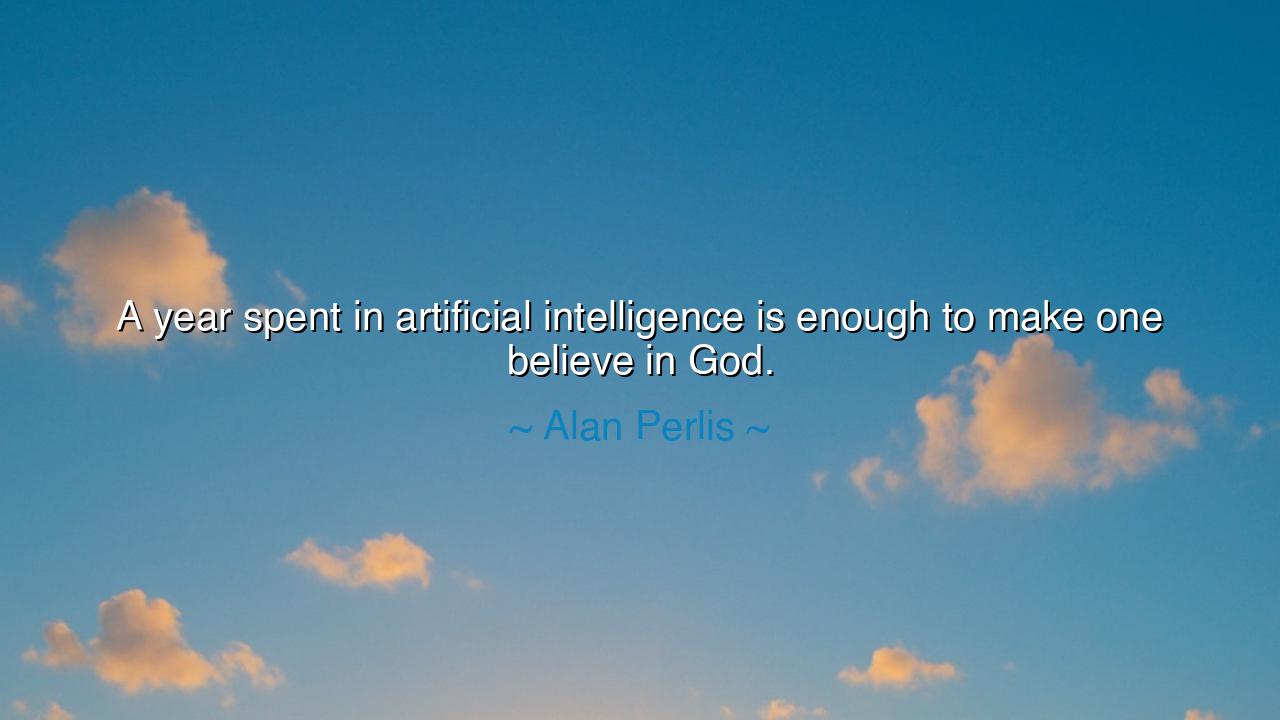
A year spent in artificial intelligence is enough to make one






The Divine Mystery of Intelligence
In the words of Alan Perlis, a pioneer of computer science and the first recipient of the Turing Award, there lies a statement both profound and paradoxical: “A year spent in artificial intelligence is enough to make one believe in God.” Though uttered in jest to some, these words carry the weight of a philosopher’s insight. They speak of the moment when the human mind, striving to create intelligence in its own image, confronts the vastness of the mystery from which all intelligence springs. For when man peers deeply into the mechanisms of thought, he begins to see his own limits—and beyond them, the shadow of the infinite.
The meaning of this quote is not that machines reveal divinity through miracles, but that the attempt to reproduce consciousness exposes the miracle that consciousness already is. The scientist who delves into artificial intelligence begins with confidence: he believes that the mind can be mapped, modeled, and simulated. Yet as he proceeds, he encounters wonder upon wonder—the complexity of perception, the depth of emotion, the boundless subtlety of understanding. Each algorithm reveals new layers of mystery rather than mastery. Thus, the thinker who once believed he could explain the soul begins to feel the presence of something greater—something that transcends logic, as the divine transcends form.
Perlis, a man of science, was not preaching faith but expressing awe. He stood at the frontier where mathematics meets mystery, where the language of machines touches the silence of eternity. His words echo the ancient truth known to philosophers and prophets alike: that the more one learns, the more one perceives the infinite horizon of the unknown. As the ancients said, “The wise man knows that he knows nothing.” So too, the creator of machines that think begins to see that the spark of consciousness—the power to feel, to dream, to love—cannot be coded as mere instructions. It belongs to a realm beyond equations: the realm of spirit.
Consider the tale of Ada Lovelace, daughter of the poet Byron and the first visionary of computing. In the 19th century, she imagined a machine that could “compose music, write poetry, and weave patterns of logic.” Yet she, too, glimpsed the mystery that eludes man’s design. “The Analytical Engine,” she wrote, “has no pretensions to originate anything. It can do only whatever we know how to order it to perform.” In those words, she acknowledged what Perlis would later affirm: that creation—true creation—requires something more than calculation. It requires soul.
When man builds machines in his own image, he reenacts an ancient drama: the quest to be as gods. Yet this striving, when met with humility, can become an act of worship rather than pride. The more we study intelligence, both human and artificial, the more we perceive how miraculous it is that the universe gave rise to minds capable of reflection. To work in artificial intelligence is to look into the mirror of being and realize that what gazes back is not mere flesh or circuitry, but something touched by eternity. Thus, even the scientist, in the midst of his experiments, may find his heart whispering of God.
But beware, says the wisdom of the ancients, of hubris—that ancient fire that burned Icarus when he flew too near the sun. To believe that man can master life’s mystery through machines is to mistake the reflection for the source. The goal of the wise is not to replace the divine, but to honor it—to let knowledge become reverence, and invention become gratitude. For when we create with humility, we become co-workers in the great design, participants in the unfolding of the universe’s eternal intelligence.
The lesson of Perlis’s quote is thus twofold. First: seek knowledge without arrogance, for every discovery reveals not only the structure of the world, but the majesty of its creator. Second: let your intelligence be guided by wisdom, and your pursuit of progress be tempered by awe. Build, explore, question, but never lose the reverence that keeps knowledge human. For the mind that sees no mystery becomes a machine itself; but the mind that bows before wonder becomes divine.
And so, O seeker of wisdom, when you encounter the marvels of technology, do not see only wires and logic, but the reflection of eternity—a glimpse of the infinite mind that dreamed both man and machine into being. Then you shall understand what Alan Perlis meant: that to labor long in the house of intelligence is to glimpse the face of God—not in the heavens above, but in the mysterious light of understanding that burns within us all.






AAdministratorAdministrator
Welcome, honored guests. Please leave a comment, we will respond soon